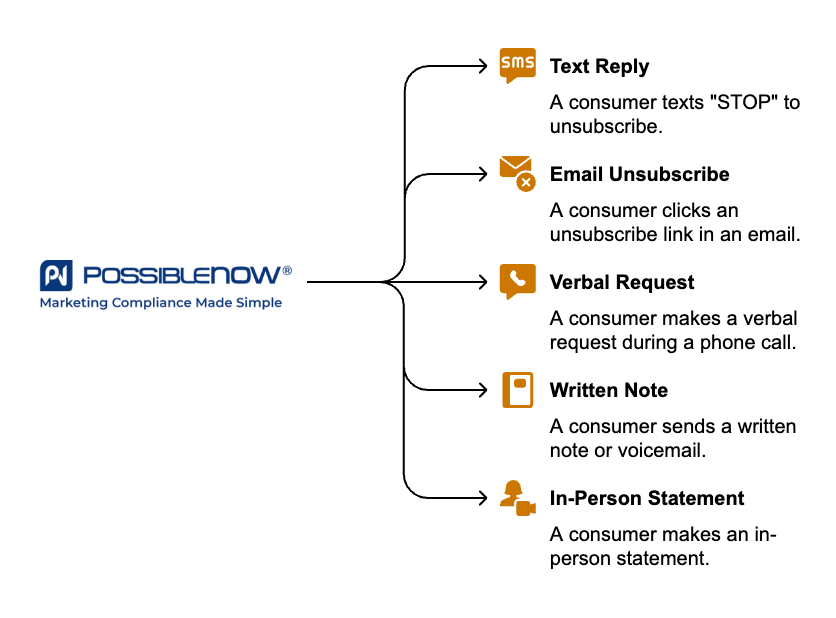Resource Center
Can You Be Fined for Contacting a Customer Who Previously Opted Out?
Type: Blog
Topic: Do Not Call Solution

Yes, you can be fined for contacting a customer who has opted out. Under the Telephone Consumer Protection Act (TCPA) and the FTC’s Telemarketing Sales Rule (TSR), continuing to call or text someone after they have revoked consent can result in substantial financial penalties and legal exposure. For email marketing, fines apply separately under the CAN-SPAM Act, which carries different requirements.
Here are some of the potential penalties for ignoring opt-out requests:
- $500 to $1,500 per unauthorized message or call under the TCPA
- Civil penalties from the FTC for violations of the TSR, including improper use of the National Do Not Call Registry
- Up to $53,088 per non-compliant email under the CAN-SPAM Act
- Class action lawsuits, where fines quickly escalate across large contact volumes
- Increased complaints and brand risk from violating consumer expectations
- Regulatory scrutiny, especially for organizations using third-party marketers or lead generators
In the following sections, you’ll find information on:
Speak With an Expert Today
What Counts as an Opt-Out?

An opt-out is any clear and reasonable expression from a consumer that they no longer wish to be contacted. Under the TCPA and supported by FCC rulings, this can take many forms:
- A text reply saying “STOP”
- Clicking an unsubscribe link in an email
- A verbal request during a phone call
- A written note, voicemail, or even an in-person statement
The TSR further extends these protections by requiring that telemarketers maintain an internal Do Not Call list and honor opt-out requests from anyone on the Federal Do Not Call Registry.
The key requirement is that the opt-out method be reasonable and accessible. If a consumer makes the request, even informally, it counts and must be acted on. Businesses should document and timestamp these requests immediately to avoid disputes.
How Long Do You Have to Stop Contacting Someone?
As of April 2025, the FCC has tightened its expectations around call and text opt-out timelines. Businesses, especially those using regulated technology, must cease all call and text marketing contact as soon as possible, but not more than 10 business days of receiving the request. This is a significant shift from the previous 30-day standard and reflects the broader regulatory trend toward rapid suppression and consumer control.
Failing to act within this window, even unintentionally, may result in a violation. For call-based outreach, the TSR also requires that companies honor the National Do Not Call Registry within 31 days of a number being added, and maintain internal suppression records for five years.
What Happens If You Ignore an Opt-Out?
The penalties for ignoring an opt-out are steep, and cumulative. Under the TCPA, each unauthorized call, text, or pre-recorded message can result in a $500 fine. If the action is deemed willful or knowing, that amount can increase to $1,500 per instance. Multiply that by thousands of contacts, and the risk quickly becomes untenable.
The FTC, under the TSR, can also bring civil enforcement actions against companies that disregard internal or national Do Not Call list rules. These often result in multi-million dollar settlements or judgments.
Are You Liable If a Third Party Makes Contact On Your Behalf?
Yes. Courts have consistently found that brands are responsible for the actions of their third-party marketing partners, including lead aggregators and remarketers, under TCPA and TSR vicarious liability standards.. If a customer opts out and that information isn’t accurately shared across the vendor ecosystem, the liability falls on the business, not just the sender.
This is particularly important in industries that rely heavily on third-party lead generation, such as insurance, finance, and home services. Without a centralized system for managing and propagating opt-out data, the risk of noncompliance grows exponentially.
Best Practices for Managing Opt-Outs
Protecting your organization from fines and customer backlash starts with operational discipline. Key steps can help reduce compliance risk and support consistent, respectful communication:
- Centralizing opt-out and consent data in one platform
- Applying opt-out status across all marketing channels, not just the one it came through
- Using real-time compliance tools to validate contact eligibility before outreach
- Keeping detailed logs and audit trails of revocation requests
- Training staff and vendors on how to recognize and record opt-outs properly
Marketers must treat opt-out management not as a back-office task but as a core component of responsible outreach.
How PossibleNOW Helps You Stay Compliant
Managing opt-outs across multiple systems, partners, and channels can be complex, but PossibleNOW simplifies the process. With our Do Not Call solution, you can suppress contacts across voice, text, and email. Our platform helps you reduce risk through real-time verification, built-in regulatory rules, and full audit trails to support a defensible position.
For companies that need to coordinate consent across departments and technologies, MyPreferences provides a centralized way to manage communication preferences at scale and in compliance with TCPA, TSR, and state-level laws.
To help protect your brand and simplify compliance across channels, talk to us about building a smarter, more unified consent strategy.
Request a Demo Today
About PossibleNOW
PossibleNOW is the pioneer and leader in customer consent, preference, and regulatory compliance solutions. We leverage our MyPreferences technology, processes, and services to enable relevant, trusted, and compliant customer interactions. Our platform empowers the collection, centralization, and distribution of customer communication consent and preferences across the
enterprise. DNCSolution addresses Do Not Contact regulations such as TCPA, CAN-SPAM and CASL, allowing companies to adhere to DNC requirements, backed by our 100% compliance guarantee.
PossibleNOW’s strategic consultants take a holistic approach, leveraging years of experience when creating strategic roadmaps, planning technology deployments, and designing customer interfaces. PossibleNOW is purpose-built to help large, complex organizations improve customer experiences and loyalty while mitigating compliance risk.
-
TCPA Regulations and Compliance: Complete Guide
Type: Blog
Topic: Do Not Call Solution
-
Defining Meaningful Metrics: 6 Soft KPIs to Measure Customer Preference Collection
Type: Blog
Topic: Preference Mgmt
-
Email Preference Center Best Practices
Type: Blog
Topic: Preference Mgmt
-
The Basics of DNC Scrubbing: What Is a Do Not Call (DNC) Scrubber and Why Do You Need It?
Type: Blog
Topic: Do Not Call Solution
-
What is Consent Management, How it Works, & Why it’s Important for Data Compliance
Type: Blog
Topic: Consent Mgmt
-
Do Insurance Companies Cover TCPA Damages?
Type: Blog
Topic: Do Not Call Solution
-
8 Best Practices for Capturing GDPR Consent
Type: Webinars
-
Data Silos Cause Communication Gaps
Type: Videos
Topic: Preference Mgmt
-
Difference Between Preferences & Consent
Type: Videos
Topic: Preference Mgmt
-
Integrate Do Not Call Compliance with Preferences
Type: Videos
Topic: Preference Mgmt
-
Customer Preferences Require More Than One Flavor
Type: Videos
Topic: Preference Mgmt
-
Give Customers Opt-Down Options
Type: Videos
Topic: Preference Mgmt
-
Preference Center Organization
Type: Videos
Topic: Preference Mgmt
-
Strategic Consultants Benefited Scotiabank
Type: Videos
Topic: Industry Testimonials
-
Best Practices for Managing Do Not Email Lists
Type: Blog
Topic: Do Not Call Solution
-
How Do Not Call Rules Apply to Nonprofit Organizations
Type: Blog
Topic: Do Not Call Solution
-
How to Train Your Call Center on DNC Rules
Type: Blog
Topic: Do Not Call Solution
